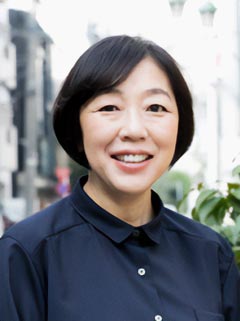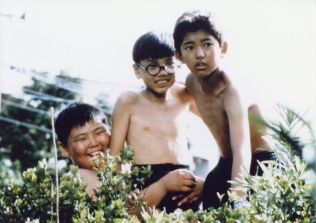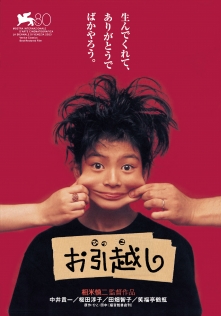Background to the 4K Restoration of Moving
As we look back on how Japanese films were received at international film festivals in 2023, we must not overlook the Best Restored Film award for the 4K digitally remastered version of Somai Shinji’s Moving at the Venice Classics section of the 80th Venice International Film Festival. This work returned to the international film festival spotlight three decades after the 1993 screening in the Un Certain Regard section of the 46th Cannes Film Festival.
The director made this film in a new collaboration with Yomiuri Telecasting Corporation in Osaka after the 1992 bankruptcy of Director’s Company, a production company run by film directors including Somai. The film depicts the growth over a summer of Renko, a sixth-grade girl who puts up a spirited resistance to her parents’ increasingly irremediable relationship.
According to Yomiuri Telecasting international sales director and restoration project member Noguchi Ayako, “We were discussing the need to preserve the film assets, and the news that Somai’s Typhoon Club would be screened at the Berlin International Film Festival that year provided the much needed push to commit to the 4K digitalization of the film.”
Although Somai participated in the Cannes Film Festival and the Taormina Film Fest in person, he was hardly a figure of international renown. A decade after his death in 2001, retrospectives of Somai began to be organized internationally, first by Tokyo FILMeX in 2011, followed by the Three Continents Festival in Nantes, the Edinburgh International Film Festival, and the Cinémathèque française in Paris in 2012. Fans of his films increased, and in Japan the 20th anniversary commemoration of his death in 2021 galvanized a kind of movement for younger generations rediscovering his works. As Yomiuri Telecasting moved forward with the digitization project, French distributor mk2 Films expressed serious interest and a cooperative alliance for worldwide sales emerged early on.
Under the supervision of cinematographer Kurita Toyomichi (Shadow of China, Taboo), the 4K restored version was scanned from the original 35-mm negative in 5K and digitally remastered in 4K. I asked Shouji Mitsuhiro of qooop, Inc., the post-production company in charge of the restoration work, what exactly the project entailed.
In Moving, different types of film stock were used for day and night scenes to create contrast, but the technology back then wasn’t quite up to realizing filmmaker aspirations. As he undertook the project this time, Kurita set the clear goal of “finishing the film as a completely new project” by using not only the 4K upscale but also the High Dynamic Range (HDR), which allowed him to express a wider range of brightness than the pre-existing Standard Dynamic Range (SDR). While retaining graininess is a valid approach, he removed as much as possible. He also restructured the colors scene by scene to make the red abundantly used to accentuate the day scenes and the cyan in the night scenes more vivid and effective. In an unusual step, he redid the sound in accordance with the image after screening the preview of the finished film.
Twenty films were nominated in the Venice Classics section of the Venice International Film Festival, including There Was a Father (1942) by Ozu Yasujiro, The Exorcist (1973) by William Friedkin, Days of Heaven (1978) by Terrence Malick, and One from the Heart (1982) by Francis Ford Coppola. Of note was There Was a Father. There were sound problems with the 16-mm, 87-minute-long master positive in Shojuku’s possession that was censored by General Head Quarters after World War II. It was later upscaled to 35 mm, but the technology of the time was unable to completely fix the audio issues. A version recently found in Russia was combined with the 72-minute version in the National Film Archive of Japan to complement the missing parts in each, and 92 minutes of the originally 94-minute-long film were restored as the longest version in existence, resulting in a film restoration entry of historic significance.
In the end, Moving won the Best Restored Film award. Noguchi believes that the fact that Hamaguchi Ryusuke, who was in the Main Competition with Evil Does Not Exist, came on stage and shared his thoughts on the film for the official screening contributed to raising Somai’s international profile.
Hamaguchi began by saying that it was incomprehensible that Somai remained unknown outside Japan. He then commented on Somai’s coming-of-age films featuring children and using long takes: “The horrifying characteristic of those films lies in moments when a vital force swells up and the pop idols brake out of the framework of ‘pop idol showcase.’” He also urged the audience to pay attention to sound in his comments on Tabata Tomoko, who played the main character of Renko: “Listen to her voice. It’s a voice so full of vitality that as soon as you hear it you believe in her. Don’t just read the subtitles. Listen to the voices as well.” Hamaguchi also provided commentary on There Was a Father, playing the role of an excellent navigator for his precursors.
The 4K digitally restored version of Moving was released in France last year, ahead of Japan. It continues to be globally distributed, with the theatrical release in Taiwan, U.S., and the Netherlands already in place. Natsu no Niwa: The Friends, another Yomiuri Telecasting collaboration, was also digitally restored recently by qooop. Both Moving and Natsu no Niwa: The Friends take place during summer vacation and capture that specific moment when a child turns into an adult, while depicting the parting with those dear to one’s heart. Both films surely resonate with children across generations.



